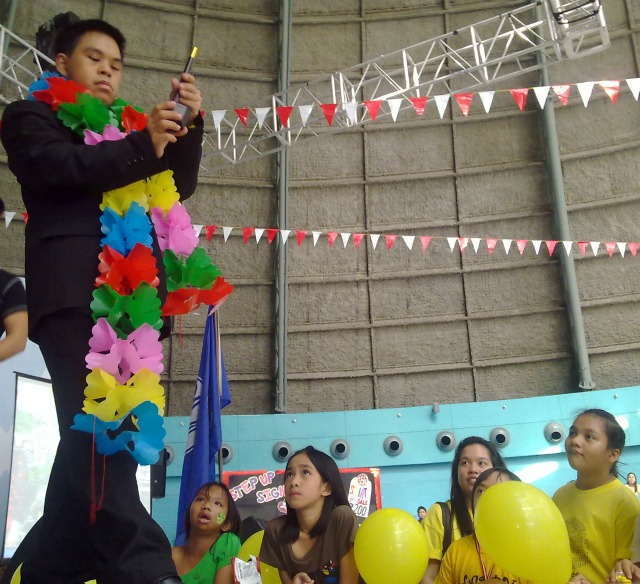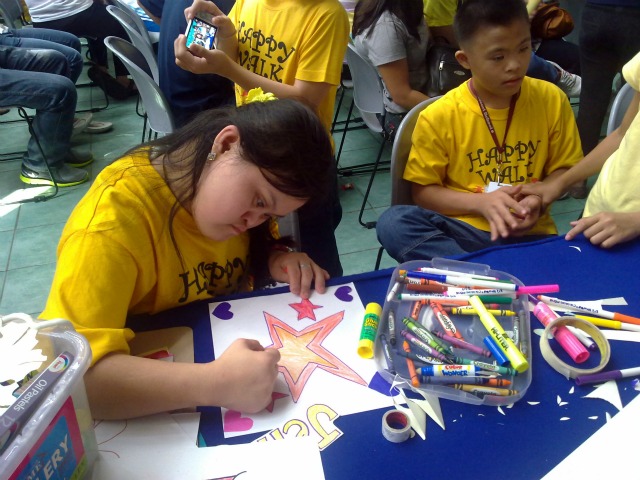Filtered By: Lifestyle
Lifestyle
True colors shine through at Happy Walk 2012 for Down syndrome kids
By CARMELA G. LAPEÑA, GMA News
On its 10th year, Happy Walk 2012 lived up to its name and then some. With bright balloons and bold banners, parents, family and friends of children with Down syndrome walked to the beat of a marching band. Held at the SM North Skydome on Feb. 19, the advocacy parade was a sunny and colorful affair. Everyone, especially the kids, was waving and smiling at the Sunday mall crowd, who would often wave back.

Children with Down syndrome steal the show from the marching band.
Themed "Step Up for Down," the activity aims to create awareness. This year's walk was followed by "Simply Amazing," a talent show that revealed just how much the kids are capable of.
"We were walking around for awareness, so that people can see and understand the children. But this time, it's really special, because unlike before when the kids would just sit, they're participating. Even our emcees are our children," said Dottie Pasia, a founding member of the Down Syndrome Association of the Philippines Inc. (DSAPI).

A child with Down syndrome performs magic tricks in "Simply Amazing."
The whole-day event featured children with Down syndrome and their various talents—from breakdancing, to drumming, to performing magic. Art booths were set up on one side of the dome, where children eagerly lined up to decorate cookies, have their faces painted, or learn the art of origami.
When Aiza Seguerra performed Phil Collins' "True Colors," quite a few people in the audience couldn't hold back tears as they sang along. "I see your true colors, and that's why I love you. So don't be afraid to let them show, your true colors"—the words were full of meaning at the Happy Walk 2012, where the kids had an opportunity to prove just how special they could be.
Trisomy 21
Down syndrome, also known as Trisomy 21, is a condition where the baby inherits 23 chromosomes from the mother and 23 from the father, plus an extra copy of chromosome 21. This extra genetic material results in developmental delays and physical features which are typical of Down syndrome.
"We would not be here if it weren't for that extra chromosome," said DSAPI President Elmer Lapeña. Celebrating its 20th year, DSAPI began in 1991, with the parents of seven children with Down syndrome, two doctors and a volunteer. Since then, the support group has grown to include parents and physicians all over the Philippines.
Named after British doctor John Langdon Down who first described the condition in 1887, the syndrome has several effects, including slanted eyes, low muscle tone, as well as problems in vision and hearing.

Many children with Down syndrome are artistic.
Down syndrome can't be prevented, and it is uncertain why it occurs. But children with Down syndrome have plenty of potential, which can be tapped with plenty of love and support.
Many children with Down syndrome are artistic. "You just have to bring it out," said Pasia, adding that one of the activities this National Down Syndrome Consciousness Month is an art exhibit at the Power Plant Mall.
"It's really amazing that they're able to bring out their feelings. When one of our artists draws, the ears are very big, because she's deaf. So maybe she makes it big, because maybe, she wants to hear. She expresses it that way," said Pasia, whose own daughter Vicky Lou, also paints, but works more with different colors.
"Iba-iba ang talents nila," says Pasia.
Understanding kids with Down syndrome
While speech is a common problem for those with Down Syndrome, Pasia says that some are surprisingly articulate. "The most important thing is that everybody should talk to them all the time and expose them to everything," shares Pasia.
Some people may be afraid that children with Down syndrome tend to be violent, but Pasia says it is no different from other children.
"Like any normal child, if you spoil them then they'll become brats. But most of them are loving children. Malambing sila, hindi sila violent. Of course, they're all but human. All of us have our moods, so sila rin. Sometimes they're not in the mood. But basically they're very malambing, very easy to get along with," she says. Vicky Lou, for one, says hello to everybody, to the point that her mother has to remind her to be careful.
While having a child with Down syndrome is no walk in the park, the parents of DSAPI all agree that it is definitely a blessing.
"One thing with Vicky Lou, she has taught us to be understanding of other people. She has taught us to be patient, to just accept things. And to live from day to day and to trust God that He will take care of everything. I never realized that we will be here, doing all these things," says Pasia. –KG, GMA News
For more information, please visit http://www.dsapi.org/
Tags: downsyndrome
More Videos
Most Popular



